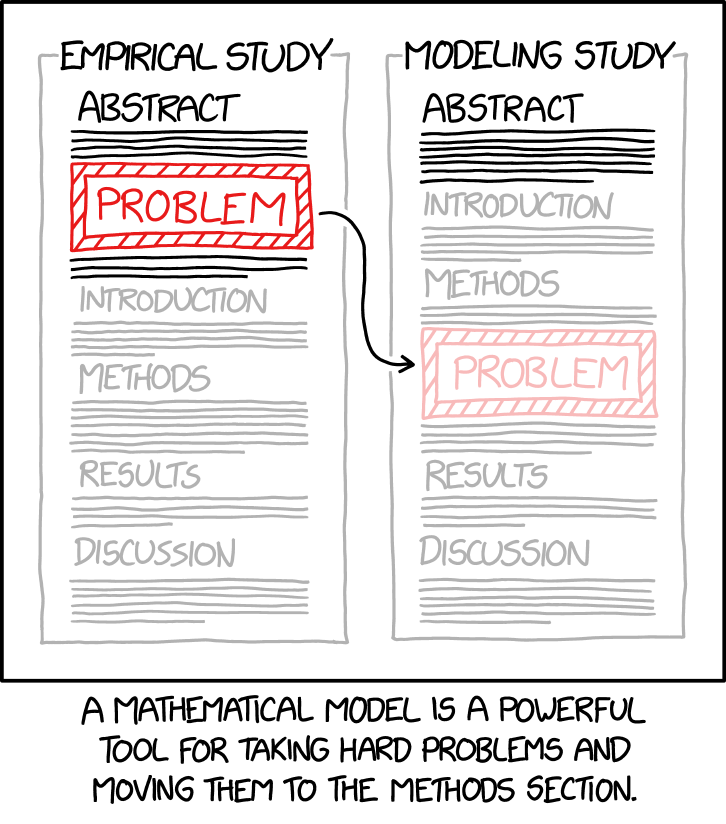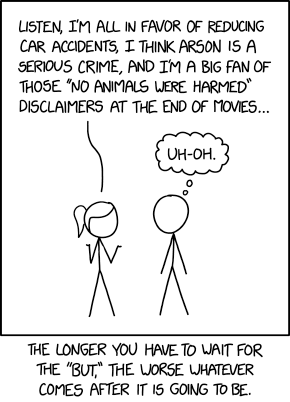Modeling
The current xkcd:

Read the rest of this entry »
Stunning speech (7:49) by Achille, a graduating student from Burkina Faso at the NTU commencement on June 6:
Read the rest of this entry »
That's the title of a wonderful new Wikipedia article from a volunteer editor who has written scores of major articles (ancient Chinese thought, religion, culture, literature, language and linguistics, lexicography, etc.) for the online encyclopedia of record. This one is about a peculiar type of ancient Chinese drinking vessel, the zhī 卮, which tilts over when full and rights itself when empty. The vessel served as an analogy for a rhetorical device called zhīyán 卮言 ("goblet word"), "a mystical linguistic ideology, which is generally interpreted to mean fluid language that maintains its equilibrium through shifting meanings and viewpoints, thus enabling one to spontaneously go along with all sides of an argument."
Along with other neologistic figures of speech, zhīyán 卮言 ("goblet word") is featured in the 33rd and final chapter, "Tiānxià 天下 ("[All] Under Heaven"), which summarizes early Chinese thought, of the Zhuang Zi 莊子 (Master Zhuang), my favorite ancient Chinese text. For a complete translation, see Victor H. Mair, tr., Wandering on the Way: Early Taoist Tales and Parables of Chuang Tzu (Honolulu: University of Hawaii Press, 1998; first ed. New York: Bantam, 1994); also available as Zhuangzi Bilingual Edition, translated by Victor H. Mair (English) and Minci Li (Modern Chinese) (Columbus: The Ohio State University Foreign Language Publications, production of the National East Asian Languages Resource Center, OSU, 2019) — this is actually a trilingual edition, since the 736 pages volume also includes the original Classical Chinese version.
Read the rest of this entry »
The CCP government has done its utmost to prevent Chinese citizens from viewing Matt Pottinger's remarkable May Fourth speech (see "Selected Readings" below) or even from reading about it or expressing their ideas concerning it. Yet some of them have taken the risk of using illegal VPNs to jump the Great Firewall (GFW) and have managed to see Pottinger's presentation with their own eyes. Among those who have watched the video of Pottinger's speech, some have dared to express their reactions to it. Here is one:
I watched Matt Pottinger's message. His Chinese is excellent except for his stressing on more than necessary words that makes him sound a bit unnatural like machine-generated. Had he been acquainted with the subtleness of spoken Chinese, he would definitely qualify for an A+.
Not surprisingly, his message can't be watched within the GFW. What's on the news are the slams and abuses on the message from the official media. Some curious people might wonder what the original message is and climb over the walls to explore. There are quite a few comments on the official news demanding access to the original message of Pottinger so that people may "join the government to criticize".
Read the rest of this entry »
Permalink Comments off
Something extraordinary happened on May 4, 2020. Deputy National Security Advisor Matt Pottinger delivered an extremely impressive speech in virtually flawless Mandarin. Here it is:
Read the rest of this entry »
Megan McArdle ("Four things Democrats need to understand about beating Trump", WaPo 1/31/2020) has something important to say about the style of Donald Trump's extemporized speeches:
Trump is a good public speaker. “Nails on a chalkboard” doesn’t quite capture how educated urbanites feel about Trump’s speaking style. A closer analogy would be having your teeth drilled — without Novocain.
His fragmented sentences, simplistic formulae (see those insults above) and rambling style would drive them wild even if the content and partisan ID were more to their taste. They like “polished” candidates who speak in complete sentences that read well when written down.
Trump, by contrast, sounds like … well, actually, he sounds a lot closer to how most people talk than a “good” public speaker. He speaks in short sentences and uses a small vocabulary. He makes up names for stuff to aid listener memory. He repeats himself. He digresses at random.
Trump talks, in short, the way people talk when they aren’t expecting their words to be written down. This informal approach horrifies those of us who love reading enough to do it on weekends. But one way to think about this is that it is not so much the difference between good and bad; it is the difference between an oral culture and a written one.
Read the rest of this entry »
If someone prefaces a sentence by saying "with all due respect", it's a sign that they are likely to unleash something negative or critical, and sometimes quite vulgar and highly disrespectful. The result, then, is to intensify, rather than to mitigate, their criticism.
Paul Gogarty, a member of Ireland's Green Party, unloaded some fairly colourful language on Labour Party member Emmet Stagg during a debate using this term.
"With all due respect and in the most unparliamentary language, f**k you Deputy Stagg, f**k you…". He then added, "I apologize now for my use of unparliamentary language."
Read the rest of this entry »
During his recent trip to Nepal, Xi Jinping blasted those who aimed to split up China by saying they would have their "bodies pulverized and bones crushed" (fěnshēnsuìgǔ 粉身碎骨). A lot of people were shocked by the harshness of the language and also wondered why he would take advantage of the first trip to Nepal by a Chinese president in more than two decades to denounce splittists back home.
Read the rest of this entry »
Sometimes, anyhow —
When you notice that Mike Pence always. talks. like. this. #FYC pic.twitter.com/5zXiNndx4s
— The Daily Show (@TheDailyShow) August 23, 2019
Read the rest of this entry »
In response to my question about a "term for exchange errors in the mapping from thematic roles to syntactic positions" (in "Thematic spoonerisms"), Jerry Friedman pointed us to hypallage. The OED's first citation for this word is to George Puttenham's 1589 The Arte of English Poesie:
1589 G. Puttenham Arte Eng. Poesie iii. xv. 143 The Greekes call this figure [Hipallage]..we in our vulgar may call him the [vnderchange] but I had rather haue him called the [Changeling].
So I looked up the book, and the context is so much fun that it deserves to be reproduced in full.
Read the rest of this entry »
No siree! These Hong Kong students are being taught to emulate Beijing government models:
In the 13rd [sic] Hong Kong Cup Diplomatic Knowledge Contest held on May 12, Hong Kong high school students militantly spoke perfect Putonghua. Their Beijing accent, tone, gestures, facial expressions all reminded one of China's Foreign Ministry Spokesperson Hua Chunying, or even Chairman Mao's wife Jiang Qing. E.g, a schoolgirl indignantly yelled, "Not a single country has fallen into a debt crisis as a result of joining the One Belt One Road!" (The fact, however, remains that due to their inability to repay debts to China, Zambia has lost to China its Kenneth Kaunda Airport and the ZESCO Power Plant; Sri Lanka has handed over its Hambantota Port to China on a 99-year lease; and Kenya is giving up its Mombasa Port to China.) Xie Feng, Commissioner of the Foreign Ministry of PRC in HKSAR, called upon the students to love the State of China and take up positions in international organizations like the UN. Critics suspect that quite a few HK kids are already thoroughly brainwashed by their pro-CCP education and may be used to infiltrate into American & other Western organizations.
Read the rest of this entry »
Today's xkcd:

Mouseover title: "Listen, I'm not a fan of the Spanish Inquisition OR predatory multi-level marketing schemes…"
Read the rest of this entry »
At the beginning of this week, we looked at a new term for "troll" in Chinese, and that led to a discussion of just what a troll is and how they behave "The toll of the trolls" (5/25/19).
One of the things we found out is that trolls love to argue for the sake of arguing / argument. They are by nature argumentative, quarrelsome, contentious, contrarian, disputatious, and truculent. So I looked around to see if there were any precedent in history or outside of the internet for this type of cantankerousness.
Read the rest of this entry »